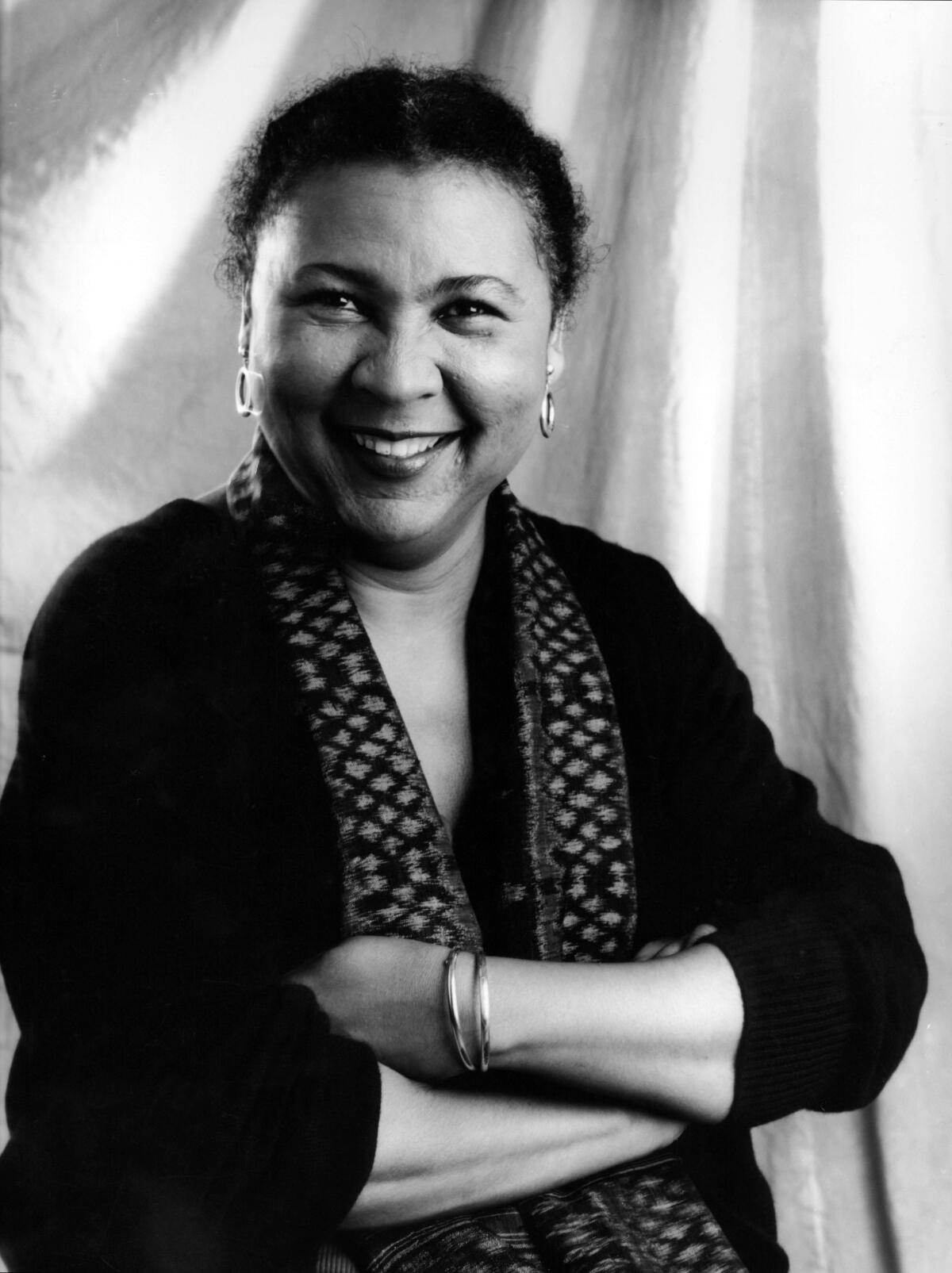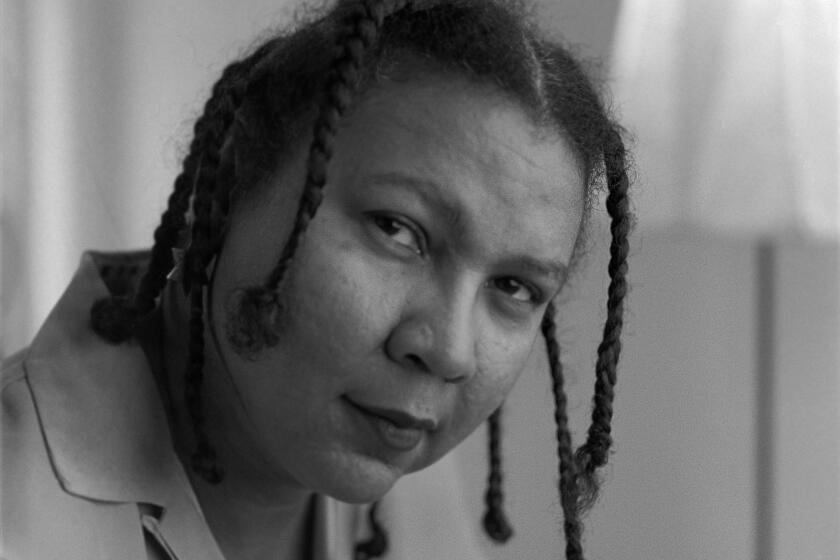Appreciation: Here’s what we all owe bell hooks, beginning with me

- Share via
“I am driven to write, compelled by a constant longing to choreograph, to bring words together in patterns and configurations that move the spirit.”
I met bell hooks in 2014. She was a primary collaborator in developing a concept I call DJ Scholarship. In fact, the notion — to reposition the DJ’s role from a party purveyor to an archivist, cultural custodian, and information specialist of music with critical value — emerged from a commissioned mixtape, “Soulful Critical Thought: bell hooks and the Making of a DJ Scholar.” My selections were true to who I thought hooks was, both within and beyond print. And what she was was a genius. She was vulnerable and complex, sharp and unashamed of how she walked the world. And with courage, discipline and dedication, she carved out space for me to exist.
Placing her ideas on the turntables created a soundtrack of her range and rigor. The mixtape moved her to invite me to Berea, Ky., on several occasions. We broke bread, shared intimate stories about our histories and exchanged visions of our future. In her home, she pointed out her most precious possessions and places: her books, her kitchen, her meditation space.
When she was ill in the last two years, I visited bell several times. Knowing she was alone, I sent her poetry and tinctures. When we spoke by phone, she talked about not wanting to die alone — and not wanting to be part of a legacy of Black women scholars who die prematurely, get quoted, excavated, rendered a once-was figure in the archive without being fully honored for their complexity.
bell hooks, the ‘All About Love’ author and cultural critic who popularized intersectionality and whose legacy spanned decades, died Wednesday.
The question of bell hooks’ legacy is urgent and rightfully demanding. We owe her the scholarly care reserved for men like Frederick Douglass and Frantz Fanon, as bell was equally profound and prolific. We hold her memory close with Toni Morrison, whose work she studied through her 1983 dissertation. hooks was an influential voice in the legendary scholarship of Saidiya Hartman, her former teacher’s assistant at Yale. She is part of a lineage of women who call on diverse genres of literature to access the inner life worlds of Black people. Her writing is a testament to the passionate poetics of Black performance.
We can never thank bell hooks enough. She was an educator and public intellectual who hand-wrote the first drafts of all her books. She crafted critical lectures in the fiery spirit of her maternal great-grandmother and (chosen) namesake Bell Sarah Hooks, born in 1893. She was the product of many Black Southern women whose sharecropping feminism shaped the voice that encircles us. We owe bell hooks for how she laid her body on the academic front line — how she nuanced questions about Black life that set us up for a more imaginable freedom.
One strategy to achieve this freedom, she believed, was radical love. bell hooks gave Black women a new way to understand the life of a mind as the starting point for activism and personal transformation. Thank you was never enough.
A central figure in Black feminist thought, she forced us to reckon with how patriarchy sometimes appears on the faces of our mothers. She helped bring new language to our critique of popular culture, to show how the legacy of slavery revealed itself through the American imagination. But to call her a cultural critic falls short. Her conviction that “imperialist white supremacist capitalist patriarchy” is an active system that lives in us all means that imagined freedom is for all of us or none of us. It’s a provocation she channeled through multiple disciplines — critic, film scholar, literary professor and public intellectual. bell hooks’ radical insistence that imperialism, white supremacy, capitalism and patriarchy are interlinked is just as relevant in this century as W.E.B. Du Bois’ prediction that the problem of the last century would be the color line.
bell hooks was my mentor, my friend, my sister and taught me to be a real writer.
We owe her for the way we wrapped ourselves in her intellectual curiosity, which became a force field around the Black people she laid theoretical hands on. Hands that drew on leftist literature, Buddhist psychology, soulful arguments, and sound interventions against racialized and gendered capitalism. We must offer our own contributions and bodies of work because bell hooks gave us a compass out of the shadows. We all found a piece of ourselves in the multiplicity of curiosities she carried in her reading, writing and listening practice.
Anyone engaging with her work now must ask deeper questions about care as an inherent part of Black feminist collective memory work. She told me that if theory isn’t life changing, it deserves less of her attention. In the last years of her life, she turned that attention toward love and mystery. Mystery books occupied space in every room. She had rituals to fill the space of uncertainty, aloneness and pandemic fatigue. The rituals carried her through the seasons.
December deaths are especially hard. They hold the quiet of winter reflection. Greg Tate, James Brown and Teena Marie left us days or weeks before the new year. So when I learned of bell hooks’ declining condition and held her hand in her last days, I thanked her for what she gave me — and us — before she transitioned in her pre-Kentucky-winter home.
Denise is an artist, scholar, writer and DJ whose work reflects on underground cultural movements. An L.A. native, she is the Sterling Brown ’22 Visiting Professor of Africana Studies at Williams College.
More to Read
Sign up for our Book Club newsletter
Get the latest news, events and more from the Los Angeles Times Book Club, and help us get L.A. reading and talking.
You may occasionally receive promotional content from the Los Angeles Times.








